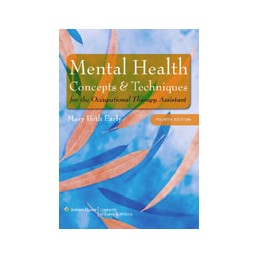- Obniżka


 Dostawa
Dostawa
Wybierz Paczkomat Inpost, Orlen Paczkę, DHL, DPD, Pocztę, email (dla ebooków). Kliknij po więcej
 Płatność
Płatność
Zapłać szybkim przelewem, kartą płatniczą lub za pobraniem. Kliknij po więcej szczegółów
 Zwroty
Zwroty
Jeżeli jesteś konsumentem możesz zwrócić towar w ciągu 14 dni*. Kliknij po więcej szczegółów
Mental Health Concepts and Techniques for the Occupational Therapy Assistant, Fourth Edition offers a solid foundation in occupational therapy processes to identify and address the needs of persons with mental health problems. This updated edition reflects important new developments in basic neuroscience, psychopharmacology, occupational therapy theory, and evaluation and treatment methods, and remains the only text of its kind written specifically for the occupational therapy assistant. The reader-friendly format is designed for the two-year college student. New content in this expanded text fulfills criteria set out in the American Occupational Therapy Associations Standards for an Accredited Educational Program for the Occupational Therapy Assistant.
Special Fourth Edition Features::
Additional features include ample tables and boxes, which highlight key information, examples of group protocols and documentation, and a list of common acronyms. In short, this one text provides the information needed by occupational therapy assistants working with clients with mental health problems in a variety of clinical or community settings.
Opis
Section I: HISTORY AND THEORY
Chapter 1: History and Basic Concepts
Chapter 2: Medical and Psychological Models of Mental Health and Illness
Chapter 3: Some Practice Models for Occupational Therapy in Mental Health
Chapter 4: The Occupational Therapy Practice Framework
Chapter 5: Human Occupation and Mental Health Throughout the Life Span
Section II: CONTEXT
Chapter 6: Understanding Psychiatric Diagnosis: DSM-IV-TR
Chapter 7: Contexts of Intervention, Service, and Care
Chapter 8: Psychotropic Medications and Other Biological Treatments
Chapter 9: Who Is the Consumer?
Section III: INTERACTING WITH PATIENTS AND CONSUMERS
Chapter 10: Therapeutic Use of Self
Chapter 11: Responding to Symptoms and Behaviors
Chapter 12: Safety Techniques
Chapter 13: Group Concepts and Techniques
Section IV: OCCUPATIONAL THERAPY PROCESS
Chapter 14: Overview of the Intervention Process
Chapter 15: Evaluation and Data Collection
Chapter 16: Treatment and Intervention Planning
Chapter 17: Medical Records and Documentation
Section V: OCCUPATIONAL THERAPY METHODS
Chapter 18: Activities of Daily Living
Chapter 19: Education and Work
Chapter 20: Leisure and Social Participation
Chapter 21: Management of Emotional Needs: Self-Awareness Skills and Coping Strategies
Chapter 22: Cognitive, Sensory, and Motor Factors: Performance Skills and Activities
Chapter 23: Analyzing, Adapting, and Grading Activities
Section VI: PROFESSIONAL DEVELOPMENT
Chapter 24: Supervision
Chapter 25: Organizing Yourself
APPENDICES
Appendix A: Case Examples
Case 1: A 21-Year-Old Woman with Depression
Case 2: A 72-Year-Old Woman with Alzheimers Disease
Case 3: A 54-Year-Old Woman with Schizophrenia Paranoid Type
Case 4: A 22-Year-Old Man with Chronic Schizophrenia and Mild Mental Retardation
Case 5: A 30-Year-Old Man with Bipolar I Disorder
Case 6: A 22-Year-Old Woman with Polysubstance Dependence and Dependent Personality Disorder
Case 7: A 37-Year-Old Man with Alcohol Dependence Disorder
Case 8: A 21-Year-Old Woman with Cocaine Dependence, Polysubstance Abuse, Bulimia, and Borderline Personality Disorder
Case 9: A 12-Year-Old Boy with Attention Deficit-Hyperactivity Disorder and Oppositional Defiant Disorder
Appendix B: Sample Group Protocols
